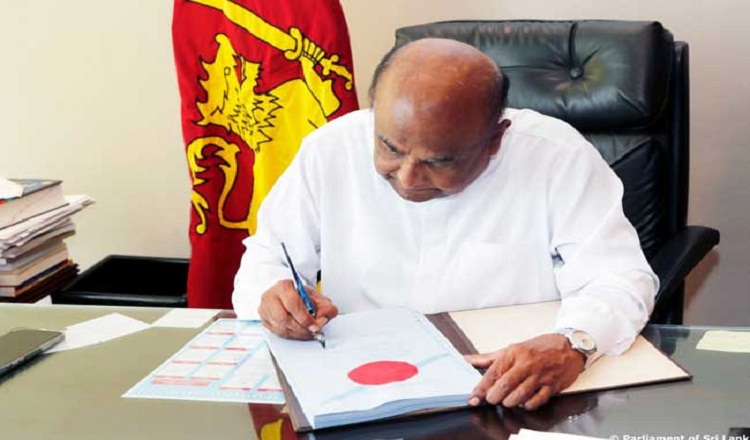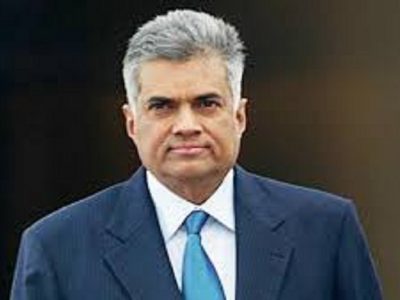(LANKAPUVATH | COLOMBO) – Speaker Mahinda Yapa Abeywardena today (31) endorsed the certificate on the 22nd Amendment to the Constitution Bill passed by a special majority in Parliament recently.
The twenty-second Amendment to the Constitution Bill was presented to the Parliament on August 10, 2022 by Minister Dr. Wijedasa Rajapaksa.
Then, according to the Supreme Court determination related to the petitions against the bill, amendments were made at the Ministerial Consultative Committee on Judicial Affairs and approval was obtained.
On October 20 and 21, the debate on the second reading of the twenty-second Amendment to the Constitution Bill was held.
At the end of the second reading, there were 179 votes in favor and 1 vote against. After that, in the voting held for the third reading of the bill, 174 votes were in favor and one vote was against.
Accordingly, the twenty-second Amendment to the Constitution Bill will come into force as the twenty-first amendment to the constitution from today (31).
The constitutional amendment draft bill which was called the 22nd Amendment so far, as another draft 21st Amendment has already been gazetted. The 21st Amendment to the Constitution is the constitutional amendment presented to the parliament by the main opposition Samagi Jana Balawegaya (SJB) in April as a private Bill. It was later published in the government gazette and challenged in the Supreme Court.
Dr. Wijeyadasa Rajapakshe, who was appointed the Minister of Justice, Prison Affairs & Constitutional Reforms, later presented a government Bill to the Cabinet of Ministers in his ministerial capacity, which was referred to as the 22nd amendment.
The Supreme Court, delivering its determination, ruled that the 21st amendment put forward by the SJB cannot proceed further without a public referendum.
In such a backdrop, the Cabinet of Ministers gave the approval to publish the 22nd amendment presented by the Justice Minister in the government gazette.
The two-day parliamentary debate on the second reading of the 22nd Amendment to the Constitution Bill commenced on October 20. At the end of the debate on October 21, a vote was called on the bill.
The second reading of the bill was passed in parliament by a majority of 178 votes. During the division, 179 parliamentarians in total voted in favour of the bill. It received only one vote against it.
The third reading of the bill was subsequently passed in the parliament by a majority of 173 votes. Announcing the result of the vote on the division, Speaker of Parliament Mahinda Yapa Abeywardena informed the House that 174 had voted in favour of the bill while only MP Sarath Weerasekara voted against it.
A total of 44 Members of Parliament including former Prime Minister Mahinda Rajapaksa were absent during the vote.
Under the 22A, the President, the Cabinet of Ministers and the National Council will be held accountable to the parliament. Fifteen Committees and Oversight Committees are also accountable to parliament.
The 22nd constitutional amendment comprises features of both the 19th amendment introduced by the Yahapalana Government and the 20th amendment brought forth under the presidency of Gotabaya Rajapaksa.
As per the draft Bill, a Constitutional Council will come into effect and it will consist of members including the Prime Minister, the Speaker of Parliament, the Opposition Leader, a Member of Parliament appointed by the President, two members nominated by both the Prime Minister and the Opposition Leader. The council will be chaired by the Speaker.
The Public Service Commission, the National Police Commission, the Audit Service Commission, Human Rights Commission, Commission to Investigate Allegations of Bribery or Corruption, Finance Commission, Delimitation Commission and the National Procurement Commission shall be responsible and answerable to the parliament. However, Election Commission is not.
As per this amendment, no person shall be appointed by the President unless such appointment has been approved by the council upon a recommendation made to the council by the Head of State in instances of appointing the Chief Justice and the judges of the Supreme Court, the president and the judges of the Court of Appeal, the members of the Judicial Service Commission other than its chairman.
The same is applicable when appointing the Attorney General, the Auditor General, the Inspector-General of Police, the Central Bank Governor, the Parliamentary Commissioner for Administration and the Secretary-General of Parliament.
The 22nd constitutional amendment abolishes the ability of a dual citizen to be appointed as a Member of Parliament.
It also includes provisions of the 20th amendment that the number of Cabinet Ministers shall not exceed 30 and the number of ministers who are not members of the Cabinet and Deputy Ministers shall not exceed 40.
However, if a recognized political party or an independent group which obtains the highest number of seats in parliament forms a national government, the number of ministers in the Cabinet, the ministers who are not in the Cabinet and Deputy Ministers shall be determined by the parliament.




